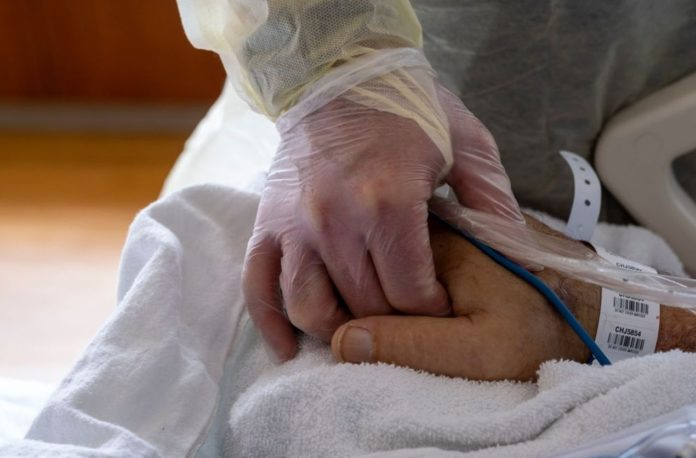High pressure (hyperbaric) oxygen can treat COVID-19 breathing problems more quickly than standard therapy, says new study.
According to the findings of a small comparative clinical trial published online in Emergency Medicine Journal, high pressure (hyperbaric) oxygen heals severe breathing issues in COVID-19 patients much faster than normal therapy, requiring an average of 3 days rather than 9 days.
The researchers claim that this technique of oxygen administration is safe and effective for treating COVID-19 patients who are severely unwell and that portable hyperbaric chambers eliminate the need to transfer patients elsewhere, reducing the danger of virus spread.
Patients who receive hyperbaric oxygen (HBO2) treatment breathe oxygen at a pressure greater than the atmospheric pressure at sea level. In most cases, this pressure is larger than 1.45 atmospheres absolute (ATA).
However, this degree of pressure has the potential to exacerbate lung inflammation and/or create potentially severe fluid accumulation (pulmonary oedema) in COVID-19 patients’ lungs.
While a few earlier studies have suggested that HBO2 is a safe and effective treatment for COVID-19 patients with breathing difficulties and inflammation, the researchers believe that more well-designed trials are needed to validate this.
To add to the body of evidence, the researchers looked at the safety and efficacy of HBO2 in patients with severe COVID-19 to see if it lowered the likelihood of respiratory distress, the requirement for mechanical ventilation, and death.
Forty patients with COVID-19 were randomly randomized to receive either normal therapy plus HBO2 or HBO2 alone after being admitted to three different public hospitals in Buenos Aires, Argentina, with severe breathing difficulties (at 1.45 ATA).
Despite oxygen supplementation, none of them were able to achieve an oxygen saturation of 90%. This is the lowest level of oxygen in the blood that is considered safe. Their average age was 55, with men accounting for two-thirds of the group.
Antibiotics (ceftriaxone 2 g/day and azithromycin 500 mg/day for 7 days), dexamethasone 8 mg/day, paracetamol 1 g every 6 hours in case of high temperature, and complications monitoring were the standard treatments. A reservoir mask was used to provide oxygen. The HBO2 treatment comprised of five or more 90-minute sessions.
A total of 19 patients in the HBO2 group and 20 in the comparison group were used in the final analysis.
The use of HBO2 treatment, which lasted an average of 6 sessions, had no statistically significant influence on the incidence of RDS, the need for mechanical ventilation, or death within 30 days of admission.
Four individuals suffered acute respiratory distress syndrome or required mechanical ventilation (3 in the comparison group and 1 in the HBO2 group). And two people perished, one from each group.
However, for most HBO2 sessions, the difference in oxygen saturation before and after treatment was significant, and demonstrated an immediate and consistent daily improvement, and at a faster rate, than in those who received normal therapy.
The time it took for those treated with HBO2 to regain normal breathing was similarly shorter: 3 days compared to 9 days for those treated with conventional therapy alone.
The researchers acknowledge that their study only included a small number of young individuals. Furthermore, because the study was terminated early due to its apparent success, they were unable to evaluate other outcomes.
Nevertheless, they said: “Our findings suggest that supplementing oxygen through HBO2 treatment contributed to an increased [oxygen saturation] in patients with COVID-19 with severe hypoxaemia [breathing difficulties], with no significant adverse effects.
“Cases of severe COVID-19 that need mechanical ventilation have a high mortality risk. Therefore, novel therapeutic strategies are needed, and this study offers evidence supporting HBO2 treatment.”
They added: “This treatment could be easily available in various settings. Portable hyperbaric chambers offer a fast set up to avoid transferring patients to other hospital areas, attenuating the risk of virus transmission.”
However, they stress that larger trials are needed to prove the treatment’s impact on survival.
Dr. John Kirkby of Washington University in St Louis, Missouri, cautions in a linked editorial that the individuals were not exactly indicative of all people brought to the hospital with COVID-19 and severe respiratory difficulties.
Furthermore, the fact that none of them got antiviral drugs or monoclonal antibody preparations may imply that they had a less severe infection. In addition, the hyperbaric pressure was modest.
Nevertheless, Kirkby concluded: “As we all look to improve our global capabilities to combat the effects of COVID-19, this study demonstrates the value of looking to make the most of available resources to properly evaluate novel treatment modalities, such as a lower cost, portable, lower pressure HBO2 to make a clinical impact on this pandemic.”
Source: 10.1136/emermed-2021-211253
Image Credit: Getty
You were reading: A new treatment for COVID-19 patients with severe hypoxaemia, study finds
